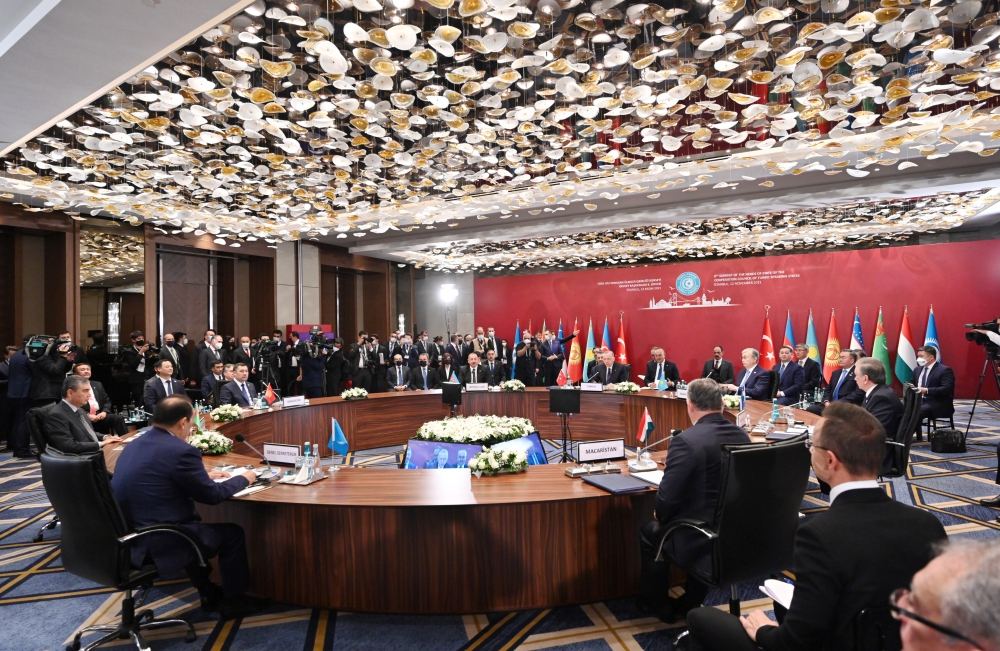BAKU, Azerbaijan, Nov. 14
By Khumay Aghajanova - Trend:
The eighth Summit of the Cooperation Council of Turkic Speaking States (Turkic Council) is being held in Turkey’s Istanbul city.
President of Azerbaijan Ilham Aliyev, President of Turkey Recep Tayyip Erdogan, President of Kazakhstan Kassym-Jomart Tokayev, President of Kyrgyzstan Sadyr Japarov, President of Uzbekistan Shavkat Mirziyoyev and Prime Minister of Hungary Viktor Orban are participating in the summit.
President of Turkmenistan Gurbanguly Berdimuhamedov is also participating in the summit for the first time as an observer.
The leaders of the countries are discussing many important issues, including the issues that determine the future of the Turkic Council at the Eighth Summit under the theme of "Green Technologies and Smart Cities in the Digital Age" in Democracy and Freedoms Island.
The important decisions on the activity and future of the Turkic Council are expected to be made at the summit. The Turkic Council is expected to be renamed the Organization of Turkic States.
The issues related to the further development of cooperation with friendly and fraternal countries in all fields are being discussed at the summit, in which chairmanship will be handed over from Azerbaijan to Turkey.
Head of the South Caucasus Political Analysts Club Ilgar Valizade told Trend that the Turkic Council is currently experiencing its most active period.
"Many important issues are expected to be discussed and documents are expected to be adopted at the summit," Valizade said. "The chairmanship of Azerbaijan in the Turkic Council coincided with both COVID-19 pandemic and the 44-day Second Karabakh War. Taking into account both points, I think that at such a sensitive period, Azerbaijan has successfully implemented activity during its presidency."
Valizade also said that new realities and new opportunities are opening for the Turkic Council.
"The commissioning of the Fuzuli International Airport, the large-scale construction, and restoration of the Zangazur corridor in Karabakh region are important for the Turkic Council and Turkic cooperation," the head of the South Caucasus Political Analysts Club added.
"Azerbaijani President Ilham Aliyev has repeatedly stated that Azerbaijan invites friendly and fraternal countries to join these processes because they will be able to benefit from this," Valizade said. "The opening of new communications also unites the Turkic states and strengthens ties."
Azerbaijani political analyst Jeyhun Ahmadli said that the development of cooperation among the Turkic-speaking countries is one of the priorities of Azerbaijan's foreign policy.
"The Turkic-speaking countries are united by common ancestry, history, culture and national values, which play a fundamental role in the mutually beneficial activity and cooperation of our countries," Ahmadli said.
"Azerbaijan has always been a supporter of a strong political organization among the Turkic-speaking countries and has played a leading role in this process," the political analyst said.
"A newly established format of cooperation among the Turkic-speaking countries was established in October 2009 at the Nakhchivan Summit of Turkic-speaking states," Ahmadli said.
Azerbaijani political analyst said that in other words, a new way of development in the Turkic Council's activity was launched at the Nakhchivan summit.
Ahmadli said that the fundamental views expressed by President Ilham Aliyev at that summit are today the main outlines of the development strategy of the Turkic Council.
The political analyst said that Azerbaijan has successfully chaired the Turkic Council for two years.
"During Azerbaijan’s chairmanship, the country made a great contribution to strengthening the activity of the Turkic Council, friendship, brotherhood, and cooperation among Turkic-speaking countries and peoples," Ahmadli said.
"After the seventh Summit of the Turkic Council in Baku on October 15, 2019, Azerbaijan took over the chairmanship," the political analyst said.
Ahmadli added that despite Azerbaijan's presidency coinciding with the COVID-19 pandemic, the country made efforts to further strengthen friendly ties and cooperation among the Turkic-speaking countries at both bilateral and multilateral levels, as well as to increase the prestige of the Turkic Council in the world.
"Azerbaijan's chairmanship in the Turkic Council coincides with a very historic period for our country," the political analyst said.
Ahmadli added that Azerbaijan has restored its territorial integrity by winning the 44-day Second Karabakh War.
"During the war, the peoples of the Turkic-speaking countries also expressed their support for the Azerbaijani people," the political analyst said.
"We can say with confidence that Azerbaijan’s victory has played an important role in further strengthening the unity and solidarity in the Turkic world," Ahmadli added.
The political analyst said that Azerbaijan's position based on international law and justice has been unequivocally supported by the Secretariat of the Turkic Council.
"The resolutions condemning the provocation committed by Armenia in the direction of Tovuz district along the state border with Azerbaijan in July 2020, supporting Azerbaijan during the 44-day second Karabakh war and condemning the missile attacks in the direction of Azerbaijan’s Ganja and Barda cities by Armenia were adopted," Ahmadli said.
"It is noteworthy that the delegation of the Turkic Council visited Ganja city, which was subjected to Armenia’s missile attacks on October 20, 2020," the political analyst said.
Ahmadli added that representatives of the Turkic Council, TURKSOY, and the Turkic Culture and Heritage Foundation visited Azerbaijan's Aghdam and Fuzuli districts in January 2021 liberated from the Armenian occupation and reviewed the results of acts of barbarism committed by the Armenian armed forces in the occupied Azerbaijani territories.
The political analyst said that the Turkic Council has initiated declaring of Shusha, the cultural capital of Azerbaijan, as the cultural capital of the Turkic world in 2023.
Ahmadli also stressed that about 160 million people currently live in the member-states of the Turkic Council and this is a very big market.
"International and regional projects contribute to the connection among our countries, but after the opening of the Zangazur corridor, this connection will increase, give a new impetus to our cooperation and have a positive impact on the volume of freight and passenger transportation among member-states," Ahmadli said.
"At the same time, integration processes and mechanisms will intensify contacts among people," Ahmadli added.






